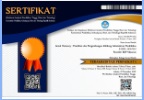Implementation of Faith-Based Full Day School Program at SD YKPP Pendopo
Abstract
Along with technological advancements and the ease of internet access through mobile phones, people of all ages—from children to adults—often use them to spend their time. This situation raises concerns among parents and their children. Therefore, the implementation of a full-day school program offers a breath of fresh air for parents, encouraging them to choose schools that apply this learning model. The aim of this study is to explore the implementation of a faith-based full-day school program at SD YKPP Pendopo. The research used a qualitative method, with data collection techniques including observation, documentation, and interviews. The results of the study show that it analyzes the implementation of the faith-based full-day school program at SD YKPP Pendopo, focusing on strategies, challenges, and efforts to overcome these challenges. Interviews revealed that strategies to avoid student boredom include the use of varied learning methods, learning media, and the arrangement of seating that considers students’ biological aspects. The full-day school aims to develop students’ intellectual, physical, social, and emotional aspects through a curriculum designed to support their growth. However, there are several obstacles such as student fatigue, limited facilities and infrastructure, and differences in students’ individual characteristics. The strategies to overcome these challenges include varied teaching methods, the use of media, adjusted seating arrangements, and learning outside the classroom. Parental support and teacher creativity are also considered crucial. This study concludes that the implementation of the faith-based full-day school program at SD YKPP Pendopo provides significant benefits but requires appropriate strategies to address emerging challenges.
Keywords: Full Day School, Implementation, Religion.
Full Text:
PDFReferences
Annur, S. (2018). Metodologi Penelitian Pendidikan. Noerfikri.
Astuti, M., Herlina, & Ibrahim. (2023). Perkembangan Islam Di Era Milenial. Jurnal Ilmu Pendidikan, 11(2), 809–820.
Astuti, M., Pratiwi, Z. P., Iklimah, L., Septiani, L., Karunia, T., Mutyati, M., & Ibrahim, I. (2024). Perkembangan Psikologi Anak dalam Pendidikan Karakter di Sekolah Dasar Negeri 157 Palembang. Dirasa, 7(1), 105–114.
Dakhi, A. S. (2020). Peningkatan Hasil Belajar Siswa. Jurnal Pendidikan Indonesia, 8(2), 468–470. https://doi.org/10.36418/japendi.v1i3.33
Dzofir, M. (2020). Pendidikan Nilai dalam Pembelajaran PAI dan Implikasinya terhadap Perkembangan Moral Siswa (Studi Kasus di SMA I Bae Kudus). Jurnal Penelitian, 14(1), 77. https://doi.org/10.21043/jp.v14i1.7401
Ibrahim, Badaruddin, K. M. S., & Ridiana, P. (2023). Operasionalisasi Laboratorium Komputer Dalam Pembelajaran. Jambura Journal of Educational Management, 4(September), 239–250.
Ibrahim, Cahyani, N. N., Astuti, M., & Febriyanti. (2021). Implementasi Manajemen Kelas dan Relevansinya dengan Hasil Belajar Siswa di Madrasah Ibtidaiyah Qur’aniah 8 Palembang. Jurnal Hikmah, 18(2), 187–199.
Ibrahim, I., Zainuri, A., Hidayat, H., Zulkipli, Z., & Noviana, R. (2021). Kinerja Pegawai Tata Usaha Pada Masa Pandemi Covid-19. Jambura Journal of Educational Management, 2(September), 137–146. https://doi.org/10.37411/jjem.v2i2.997
Moleong, L. J. (2019). Metode Penelitian. Remaja Rosda Karya.
Nazir, M. (2018). Metode Penelitian. Ghilmia Indonesia.
Samanhudi. (2021). Perencanaan Sarana Dan Prasarana Pendidikan Islami di Lembaga Pendidikan. Rayah Al-Islam, 5(02), 268–294. https://doi.org/10.37274/rais.v5i02.461
Satria, D. (2019). Dampak Kebijakan Penerimaan Peserta Didik Baru (Ppdb) Sistem Zonasi Di Sma Negeri 2 Bandar Lampung. In Jurusan Ilmu Pemerintahan Unila (Vol. 53, Issue 9).
Sugiyono. (2019). Metode Penelitian Kuantitatif Kualitatif dan R & D. Alfabeta.
Sugiyono. (2022). Metode Penelitian Kualitatif. Alfabeta.
Syukur, F. (2021). Model Strategi Pemasaran Jasa Pendidikan Islam pada SD Nasima Semarang. Jurnal SMART (Studi Masyarakat, Religi, Dan Tradisi), 7(01), 1–14. https://doi.org/10.18784/smart.v7i01.1084
Zaim, M. (2020). Media Pembelajaran Agama Islam Di Era Milenial 4.0. POTENSIA: Jurnal Kependidikan Islam, 6(1), 1. https://doi.org/10.24014/potensia.v6i1.9200
DOI: https://doi.org/10.33394/vis.v13i1.15270
Refbacks
- There are currently no refbacks.
Copyright (c) 2025 Jurnal Visionary : Penelitian dan Pengembangan dibidang Administrasi Pendidikan

This work is licensed under a Creative Commons Attribution-ShareAlike 4.0 International License.
This Journal has been Indexed by:
Jurnal Visionary : Penelitian Dan Pengembangan Di Bidang Administrasi Pendidikan
ISSN: 2656-7653 (online) / 2503-4669 (Print)
Published by: Prodi Administrasi Pendidikan, Universitas Pendidikan Mandalika
Email: [email protected]

This work is licensed under a Creative Commons Attribution-ShareAlike 4.0 International License.








